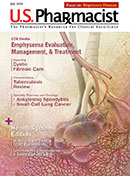Cleveland, Ohio—Lung cancer (LC)—the second most common cancer and the leading cause of cancer deaths in the United States—has been tentatively linked to the use of insulin therapy to manage type 2 diabetes mellitus (T2DM), according to a new study.
“The impact of non-insulin antidiabetic drugs, particularly GLP-1 receptor agonists (GLP [glucagon-like peptide]-1RAs), on LC risk is not well understood,” according to a new Case Western Reserve University School of Medicine–led study.
The investigation evaluated LC risk in T2DM patients, comparing seven noninsulin antidiabetic agents with insulin. The study team used the TriNetX Analytics platform to analyze deidentified electronic health records of about 1 million T2DM patients treated between 2005 and 2019, excluding those with prior antidiabetic use or lung cancer. The results were published in the journal Cancers.
The results indicated that all noninsulin antidiabetic drugs, except alpha-glucosidase inhibitors, were associated with significantly reduced lung cancer risk compared with insulin, with GLP-1RAs showing the greatest reduction (hazard ratio, 0.49; 95% CI, 0.41-0.59).
“GLP-1RAs were consistently associated with lowered LC risk across all histological types, races, genders, and smoking statuses,” the authors advised. “These findings suggest that non-insulin antidiabetic drugs, particularly GLP-1RAs, may be preferable for managing T2DM while reducing LC risk.”
Background information in the article pointed out that insulin therapy, prescribed to millions worldwide, remains at the center of T2DM management but that recent studies have suggested a potential connection between insulin therapy and an increased incidence of LC.
“This association may stem from mechanisms such as insulin resistance, hyperinsulinemia, insulin promotion of LC growth, and the promotion of an inflammatory microenvironment,” the authors suggested. “In preclinical models, insulin has been shown to foster LC growth through pathways related to these mechanisms, and clinical outcomes in LC patients receiving insulin therapy have been observed to be worse compared to those using other antidiabetic interventions.”
The researchers explained that, according to retrospective studies, noninsulin antidiabetics have demonstrated a differential risk of LC, although the evidence is both limited and controversial.
“Metformin, the most widely prescribed antidiabetic drug, has been widely explored for its potential anticancer properties, while SGLT2 inhibitors are being explored for their potential in LC prevention,” the researchers added. “Other antidiabetics, such as sulfonylureas, alpha-glucosidase inhibitors (AGIs), thiazolidinediones (TZDs), and dipeptidyl peptidase-4 (DPP-4) inhibitors, have been associated with varying levels of cancer risk in LC studies. Among these, glucagon-like peptide 1 receptor agonists (GLP-1RAs) stand out for their wide-ranging benefits, including glycemic control, weight reduction, and immune modulation. Recent findings indicate that GLP-1RA use is linked to a decreased colorectal cancer risk.”
The study team noted that the absence of research comparing the impact of different antidiabetic medications on lung cancer risk prevents the development of clear guidelines for optimal treatment of T2DM in patients with comorbidities, such as tobacco use.
The content contained in this article is for informational purposes only. The content is not intended to be a substitute for professional advice. Reliance on any information provided in this article is solely at your own risk.
Published July 31, 2024






